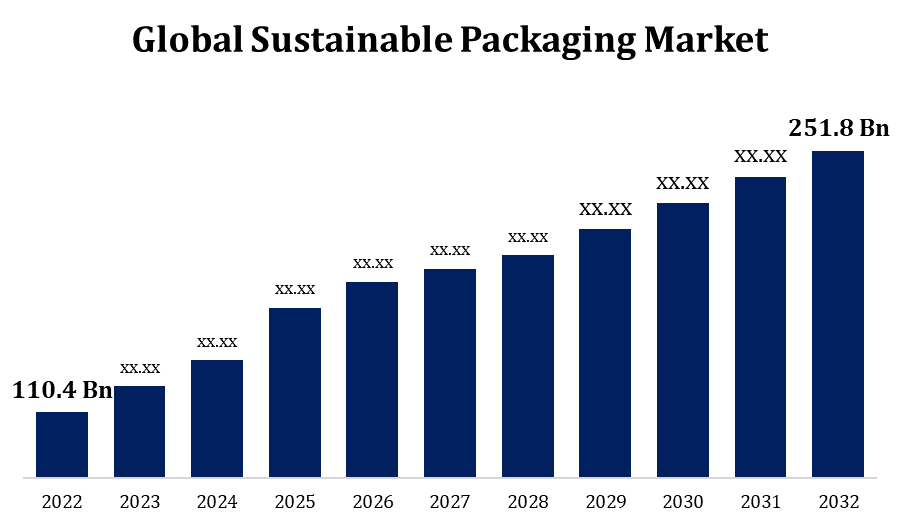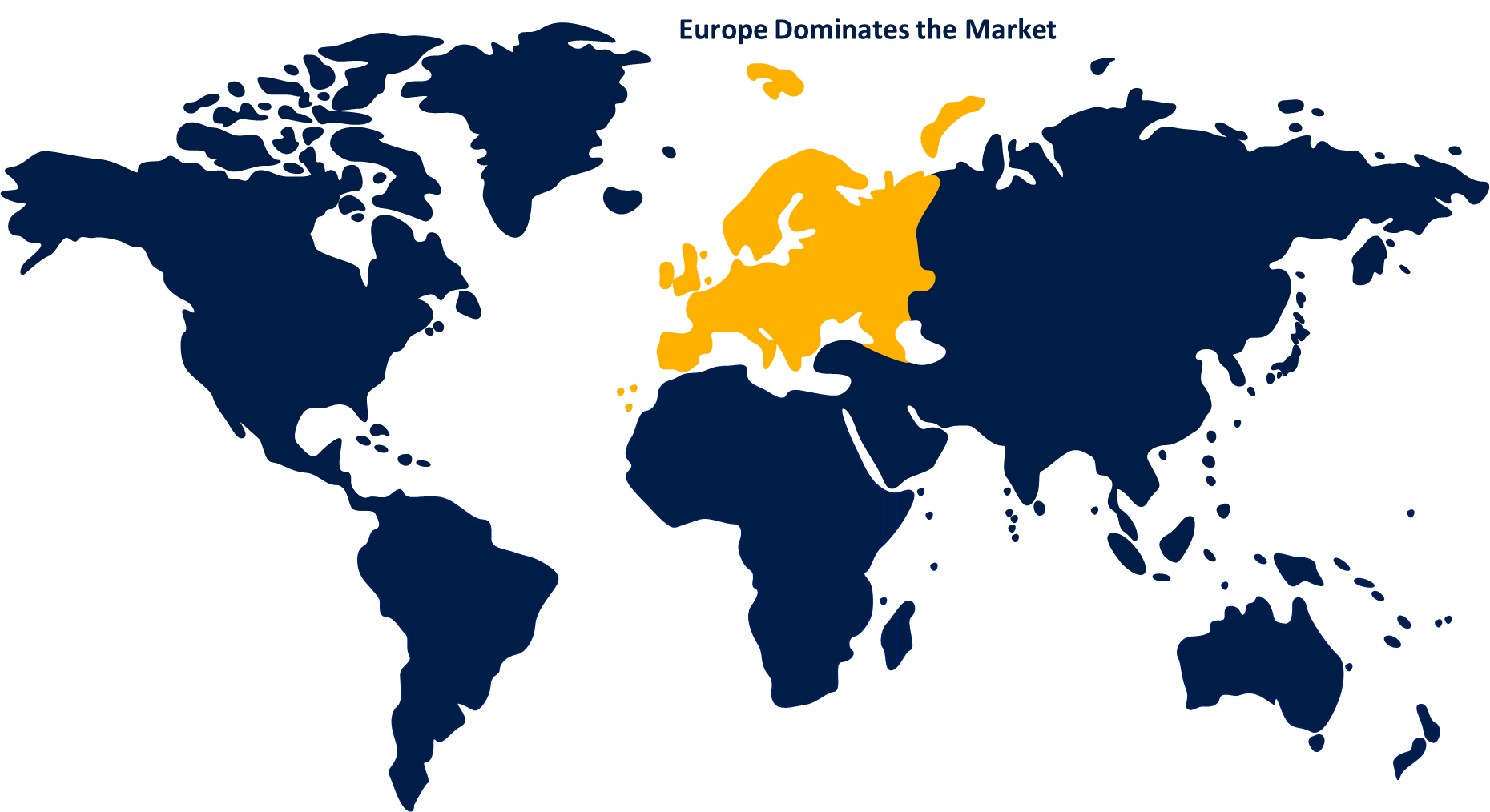Global Sustainable Packaging Market Size To Worth USD 251.8 Billion by 2032 | CAGR of 8.4%.
Category: Advanced MaterialsGlobal Sustainable Packaging Market Size To Worth USD 251.8 Billion by 2032
According to a research report published by Spherical Insights & Consulting, the Global Sustainable Packaging Market Size to grow from USD 110.4 Billion in 2022 to USD 251.8 Billion by 2032, at a Compound Annual Growth Rate (CAGR) of 8.4% during the forecast period.

Get more details on this report -
Browse key industry insights spread across 200 pages with 110 market data tables and figures & charts from the report on The “Sustainable Packaging Market Size By Packaging Type (Recycled content packaging, Reusable packaging, Degradable packaging); By Material (Glass, Paper, Metal, Plastic); By Application (Food & beverage, Personal care, Healthcare, Others); & Forecast, 2023 – 2032.” Get Detailed Report Description Here : https://www.sphericalinsights.com/reports/sustainable-packaging-market
Sustainable packaging refers to the development and application of packaging materials and methods that have few negative effects on society and the environment. The goals of sustainable packaging include decreased waste, resource conservation, decreased greenhouse gas emissions, and promotion of responsible material usage. Customers were becoming more interested in products with sustainable and eco-friendly packaging. This shift in consumer expectations led to several businesses embracing sustainable packaging techniques. Consumer anxiety over the massive amount of packaging trash generated by online shopping has led to a surge in the need for packaging materials that are not only protective but also lightweight, recyclable, and easy to dispose.
COVID 19 Impact
Concerns about the spread of viruses led some governments to temporarily suspend their bans on single-use plastics. This was a setback for campaigns to reduce plastic waste and encourage environmentally friendly packaging choices. Because the outbreak disrupted global supply chains, it took longer for sustainable packaging materials to become available. This affected the development and application of environmentally friendly packaging. While the epidemic was going on, some consumers remained committed to sustainability while others shifted their objectives. Because of the instability of the economy and health concerns, consumer behaviour altered, which had an impact on the need for environmentally friendly packaging. The pandemic's rising demand for single-use packaging, which was viewed as less hygienic and momentarily suffered setbacks, presented challenges for reusable packaging methods.
Biodegradable packaging materials naturally break down into non-toxic substances like water, carbon dioxide, and biomass when exposed to specific environmental variables (such sunlight, moisture, and bacteria). They are consequently a more environmentally friendly alternative to traditional plastics, which can persist in the environment for hundreds of years. The use of biodegradable packaging is advantageous for firms in the food and beverage, cosmetics, pharmaceutical, and other industries. It provides a range of packaging choices, including trays, bags, containers, and films. Although there are many advantages to using biodegradable packaging, it is important to consider factors like proper disposal infrastructure and labelling to ensure that these materials breakdown correctly when used.
Innovative materials must be used to reduce the use of single-use plastics, which have become a major environmental concern. Corporations, governments, and consumers are all looking for alternatives. The market today offers a wide range of cutting-edge materials for sustainable packaging, including bioplastics, bio-based materials, packaging made of algae, packaging made of mycelium (mushrooms), and edible packaging. These materials provide alternatives to typical plastics that are better for the environment. These materials can now be used for a larger variety of things because to advances in their barrier properties, including food and beverages. This increase of applications is crucial for the usage of sustainable materials.
Insights by Packaging Type
The recycled packaging type segment accounted for the largest market share over the forecast period 2023 to 2032. A circular economy, where products are recycled and reused, is becoming more and more popular. Recycled packaging is vital to the creation of a circular economy since it closes the loop on the product lifecycle. Although recycled materials may initially cost more than virgin materials, there may be long-term cost advantages related to waste disposal, the procurement of raw materials, and resource conservation. Design improvements in recycled packaging materials have addressed difficulties with sturdiness, performance, and aesthetics. Recycled materials are becoming more and more competitive in terms of functionality. Recycled packaging can aid businesses in gaining the respect and loyalty of customers who are environmentally conscious, hence boosting market share and client retention.
Insights by Material
The paper segment accounted for the largest market share over the forecast period 2023 to 2032. Most paper products may be recycled multiple times, and paper-based packaging is straightforward to recycle. The circular economy and waste reduction objectives are aided by this. Paper is a desired option for companies aiming to reduce the environmental impact of their packaging because it spontaneously decomposes and is intrinsically biodegradable. Demand for secure and environmentally friendly packing materials has increased as e-commerce has grown. Corrugated cardboard and other paper-based packing materials are often used for shipping.
Insights by Application
The food and beverage segment accounted for the largest market share over the forecast period 2017 to 2032. Food and beverage brands can enhance their reputation and perception by prioritising sustainable packaging. Consumers usually associate sustainability with ethical and responsible business practises. The food and beverage industry is actively researching cutting-edge innovations, such as bio-based plastics, edible packaging, and mycelium-based packaging, to decrease the environmental impact of packaging. Food and beverage businesses are actively teaching consumers about correct disposal and recycling practises in order to ensure that environmentally friendly packaging materials are effectively maintained.
Insights by Region

Get more details on this report -
Europe is anticipated to dominate the Sustainability Packaging market from 2023 to 2032. European countries have set goals to reduce plastic waste and increase recycling rates. As a result, recycling techniques and substitute materials for packaging have been developed and used. Recycled materials are being used more and more in the manufacture of packaging. The EU's Single-Use Plastics Directive mandates the use of more recycled material in specific packaging types. The concept of a circular economy, in which goods are reused, recycled, and repurposed, has been adopted by European businesses.
Asia Pacific is witnessing the fastest market growth between 2023 to 2032. The Asia-Pacific region is home to some of the world's fastest-growing economies. As disposable incomes increase, consumers are becoming more ecologically conscious and seeking for products with sustainable packaging. With the growth of e-commerce in countries like China, India, and Southeast Asian countries, there is an increase in demand for packaging materials that are not only environmentally friendly but also protective and affordable to transport.
Major players in the market
- Sealed Air Corporation
- Plastipak Holdings, Inc.
- Sonoco Products Company
- Amcor plc
- BASF SE
- Mondi plc
- DS Smith plc
- Emerald Packaging
- Nampak Ltd.
- Tetra Pak
- Smurfit Kappa Group PLC
- WestRock Company
- Crown Holdings, Inc.
- Ardagh Group S.A.
- Ball Corporation
- Elopak AS
- SGF Packaging Co., Ltd.
Market Segmentation
This study forecasts revenue at global, regional, and country levels from 2023 to 2032.
Sustainability Packaging Market, Packaging Analysis
- Recycled content packaging
- Reusable packaging
- Degradable packaging
Sustainability Packaging Market, Application Analysis
- Glass
- Paper
- Metal
- Plastic
Sustainability Packaging Market, Material Analysis
- Food & beverage
- Personal care
- Healthcare
- Others
Sustainability Packaging Market, Regional Analysis
- North America
- US
- Canada
- Mexico
- Europe
- Germany
- Uk
- France
- Italy
- Spain
- Russia
- Rest of Europe
- Asia Pacific
- China
- Japan
- India
- South Korea
- Australia
- South America
- Brazil
- Argentina
- Colombia
- Middle East & Africa
- UAE
- Saudi Arabia
- South Africa
About the Spherical Insights & Consulting
Spherical Insights & Consulting is a market research and consulting firm which provides actionable market research study, quantitative forecasting and trends analysis provides forward-looking insight especially designed for decision makers and aids ROI.
Which is catering to different industry such as financial sectors, industrial sectors, government organizations, universities, non-profits and corporations. The company's mission is to work with businesses to achieve business objectives and maintain strategic improvements.
CONTACT US:
For More Information on Your Target Market, Please Contact Us Below:
Phone: +1 303 800 4326 (the U.S.)
Phone: +91 90289 24100 (APAC)
Email: inquiry@sphericalinsights.com, sales@sphericalinsights.com
Contact Us: https://www.sphericalinsights.com/contact-us
Need help to buy this report?